PURPOSE This study analyzed the relationship among coaching behaviors, motivational climate, sports competence, effort, and failure tolerance as perceived by high school athletes. Additionally, it examined whether motivational climate, competence, and effort mediate the relationship between coaching behaviors and failure tolerance. METHODS Using questionnaires measuring autonomy-supportive coaching behavior, controlling coaching behavior, motivational climate, sports competence, effort, and failure tolerance, 365 high school athletes were surveyed. Using SPSS 28.0 and Amos 28.0 software, descriptive statistics and structural equation modeling were conducted along with the following types of analyses: reliability, correlation, confirmatory factor, convergent validity, and discriminant. Additionally, the bootstrap method was used to verify serial multiple mediating effects. RESULTS Autonomy-supportive behavior had a significant positive effect 1) on motivational climate, sports competence, and effort and 2) on failure tolerance. 3) Controlling coaching behavior had a significant negative effect on motivational climate and sports competence. 4) Motivational climate and 5) sports competence both had a significant positive effect on effort. 6) Effort had a significant positive effect on failure tolerance. Last, in the relationship between autonomy-supportive behavior and failure tolerance, motivational climate, sports competence, and effort showed partial mediating effects. CONCLUSIONS This study confirms the importance of coaches’ autonomy-supportive behavior in determining failure tolerance among adolescent athletes. Based on this information, counseling (educational) programs aimed at enhancing performance can be developed and provided in sports settings, thus fostering success among athletes.
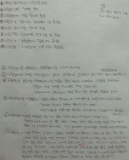
Values, such as development and social responsibilities, are added on victory-oriented Korean sport. Those change of values are along with discussions regarding improvement of players’ training environment, however, discussions on improvement of players’ training environment so far rather focused on ideological concepts, such as players’ holistic human development and human rights, therefore, there was a lack of discussion on practical training methods or teaching methods. This study focused on mental coaching as a specific method for improvement of players’ training environment. Mental coaching provides players with performance enhancement, personal growth, and self-actualization utilizing mental training, consulting, and mentoring in their training processes. This study examined a possibility of introduction of mental coaching as a training camp method for players by creating a training camp reflected on mental coaching perspectives and verifying the program effects of application. First of all, a mental coaching training camp was created through consultations with mental coaches, supervisors, and coaches. Goals of the mental coaching training camp were development of competition-routines, establishment of competition-circumstance coping strategies, comprehension of elite-players’ psychological resources, goal-setting, and motivation and the program consist of badminton competitions, mental education, a special lecture by an Olympic gold medalist, tracking, and sharing. The mental coaching training camp proceeded with middle and highschool badminton players and 31 coaches during three-days and four-nights. As results, the training camp was effective for players’ performance enhancement, personal growth, and self-actualization and team coaches realized a necessity of improvement in terms of their training and teaching behaviors. In other words, mental coaching training camp played a role as a source of long-term change as well as short-term results, thus, this study verified that the mental coaching can be introduced as a training camp method. It is anticipated that this study can provide sport fields and academic sport areas with an opportunity to consider both training contents and methods when it comes to discussion players’ training environment development.


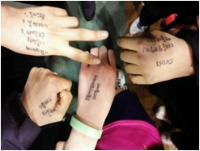
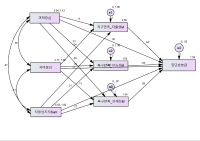
In sport context, the motivational climate created by significant others (e.g., coachs and peers) has been influences on the athletic-student's motivation, engagement, performance, and skill development. Collective efficacy is important for team performance because it influences a group's task choice, effort expenditure, persistence in the face of failure, and resistance to discouragement. This study was to examine the influence of peer motivational climate (i.e., task-involving and ego-involving motivational climate) and coach autonomous support for basic psychological need satisfaction and collective efficacy. In the study, participants were 289 athletic-students' of team sports. In the study then, questionnaire was assessed using by the correlation and path analysis. The results showed that task-involving motivational climate significantly predicted of collective efficacy, while ego-involving motivational climate were negatively predict to the collective efficacy. The results suggest the importance of considering peer influence in addition to coach influence when examining motivational climate in team sport.


Purpose This study was to examine the effect of athletes’ personality on coach-athlete maintenance of relationship. Methods For this purpose, the data was collected by 284 athletes using personality five factor questionnaire and Coach-Athlete Relationship Maintenance Questionnaire(CARM-Q). correlation and multiple regression analysis were conducted to verify the relationship between five personality factors and maintaining coach-athlete relationship. Results The results were as follows: Personality had a significant effect on the maintenance of coach-athlete’s relationship. Firstly, the artificial neural network was analyzed to find the influence of personality that determine positive relationships with coaches. Conclusion As a result, it was confirmed that the favor was the main discriminant factor in maintaining the relationship of coach-athlete. Finally, openness and sincerity were found to maintain and develop the positive relationship with coaches.

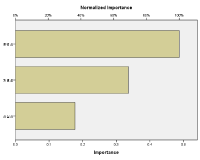
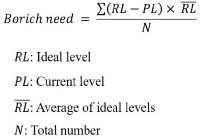
Purpose This study was designed to develop a curriculum for pre-service golf coaches at universities to enhance the coaches’ competencies to counsel athletes on the field. Methods This study was conducted in accordance with the revised and supplemented procedures for the national competency standard (NCS) based curriculum development outline under the level of application of individual instruction-level classes among the types of curriculum development. Results The results were as follows: First, the elements of the counseling competence were guided by conflict resolution counseling, psychological skills training, guidance counseling, coordination and Intervention, and relationship formation. Second, the curriculum was adopted as a curriculum for sports psychology, theory and practice of counseling, counseling practice and super-vision, and psychological skills training, and non-disciplinary activities were participation in group and personal counseling, and an open counseling case study. Third, the feasibility of the curriculum was calculated in the range of 0.8 to 1.0 for all areas to be reasonable. Conclusions The results of this study have structured the counseling competencies required for pre-service golf coaches. Based on this, the results of the study suggest counseling courses in the curriculum of university. This is expected to ultimately seek to improve the coaching field by enhancing the capacity of the coaches.



PURPOSE For student-athletes to be able to successfully dedicate themselves to training and competition, the following key factors play an important role: The coach, team climate, and individual motivational characteristics. To test this hypothesis, the structural relationships between having a perceived autonomy support, a caring climate, basic psychological needs, and sport commitment were analyzed. METHODS Participants were 297 high school athletes registered with the Korea Olympic Committee (203 males, 94 females, Mage=17.88 years). Data were collected using sports climate questionnaires for autonomy support, caring climate scale, basic psychological needs scale, and sport commitment measurement. The collected data were analyzed using descriptive statistics, correlation analysis, and structural equation modeling. RESULTS The model’s fitness was indicated by x2/df=2.797 (x2=106.288, df=38), CFI=.977, TLI=.967, RMSEA=.078 (90% CI=.061, .096). Examining the various path coefficients revealed that coach autonomy support had a positive effect on the athlete’s caring climate, basic psychological needs, and sport commitment. The caring climate had a significant effect on basic psychological needs, but did not have a statistically significant effect on sport commitment. Finally, basic psychological needs had a positive effect on sport commitment. CONCLUSIONS Coach autonomy support fosters a caring climate, and athletes who are able to perceive this are able to dedicate themselves to their sport since their basic physiological needs are met. Therefore, coaches should use appropriate coaching strategies to enhance athletes' autonomy and foster a caring climate, as both are essential factors for meeting athletes' psychological needs and promoting sport commitment.
PURPOSE The purpose of this study was to validate the Korean version of Coaching Life Skills in Sport Questionnaire (KCLSS-Q). METHODS Substantive, structural, and external stages were undertaken to address the purpose of this study. At the substantive stage, the scale was translated by discussing with an expert panel and testing item clarity. Ten coaches (9 males, Mage=33.80, SD=4.21) participated in the item clarity test. At the structural stage, descriptive statistics, exploratory factor analysis (EFA), and confirmatory factor analysis (CFA) were conducted. A total of 249 (214 male, Mage=34.18, SD=6.82) and 232 coaches (186 male, Mage=34.26, SD=7.69) participated in the EFA and CFA, respectively. At the external stage, correlation analysis using other scales (emotional intelligence in sport coaching, EISSC) was conducted to examine concurrent validation. A total of 130 copies of the CFA data were randomly extracted and used for this stage. RESULTS For the EFA, the scale extracted five factors with 27 items. In the CFA, however, five factors with 26 items were identified as an appropriate structure. Finally, the relationships of all sub-factors between KCLSS-Q and EISSC were statistically significant in the correlation analysis. CONCLUSIONS KCLSS-Q should reasonably consists of nine items on structuring and facilitating a positive sport climate, five on understanding life skills, four on practicing life skills, five on understanding life skills transfer, and three on practicing life skills transfer. KCLSS-Q can be used as a valid measure to evaluate the coaching life skills of Korean coaches.
PURPOSE This study aimed to apply a capacity building program to sport life skill leaders and to provide cases of this process. METHODS The study participants included four leaders (male=2, female= 2, Mage=37.5) who were managing a sport life skills program at a university. They participated in a capacity building program, which consisted of (a) understanding (leader seminar), (b) application (managing the sport life skills program), and (c) evaluation (leader’s self-reflection), which were conducted in eight sessions. Four leaders conducted self-evaluations using program quality assessment (PQA) during every session, and quantitative and qualitative data were collected. Qualitative data were derived using a cross-case analysis, and quantitative data were used for calculating the effect size after performing the paired t-test. RESULTS Analyzing the reported cases of sport life skill leaders, the use value of the capacity building program was identified. Furthermore, the cases reported by the four leaders enabled observation of how the leader’s capabilities were strengthened. In the paired t-test, the effect size of physical and psychological safety, appropriate structure, supportive relationship, opportunities to belong, support for efficacy mattering, opportunities for life skill building, excluding integration of family, school, and community effort, were all significant. All effect sizes were found to have “very large effects.” CONCLUSIONS The capacity building program played a positive role in strengthening the leaders’ life skill coaching capabilities. These findings have practical implications—chiefly, it is important to strengthen leaders’ or coaches’ capabilities in order to foster life skill development and transfer of student-athletes.
The purpose of the study was to investigate the meteorological and environmental information which should be provided for a winter sport event from the users' point of view, and to provide the fundamental data for the construction of the meteorological information to be specified in a sport event. For this study, some case studies were conducted at the center of Winter Olympic Games. Essential meteorological elements which should be fundamentally provided for a sport event were analyzed. Also, in-depth interviews with athletes, coaches were held to explore the meteorological elements needed from the users' point of view. On the basis of the results analyzed from the study, considerable meterological and environmental elements for supporting 2018 Pyeongchang Winter Olympic Games were suggested through the discussions with meteorological and sport event experts. As results of the study, essential requirements regarding the meterological and environmental information were extracted. Based on the essential requirements, a method of constructing the information in support of meteorology for Pyeongchang Winter Olympic Games was presented.
Purpose Philosophical inquiries into physical education and sport pedagogy(PESP) have not been active until lately. A renewed interested has grown as scholars in UK and European countries have begun philosophical analysis since 2000. This study purports to review the philosophical studies in PESP during the last 50 years, and to forecast the future of SP in Korea based on its strength and weakness. Methods Literature review is adopted as the main method, as the philosophical study requires the conceptual analysis on the ideas. The past research, current main studies and future prospects are analyzed according to the three layers of the professional, the theoretical, and the personal dimensions. Results First, in the professional dimension, the philosophical inquiry by the SP philosophers and the educational inquiry by the sport philosophers are identified. Second, in the theoretical dimension, the exploration on the nature of research in PESP, the suggestions of PE models, the examination of teaching-learning in PE, the promotion of teacher/coach education and professional development, and the analysis of PE curriculum issues and policies are actively produced. Third, in the personal dimension, the practitioner research by PE teacher/professor/coach and the self-study of sport coaches have are begun to be conducted. Conclusions For the prospect of PESP in Korea, it can be said that study in the first dimension would not be bright, where as those of the second and the third would be very good for the near future.